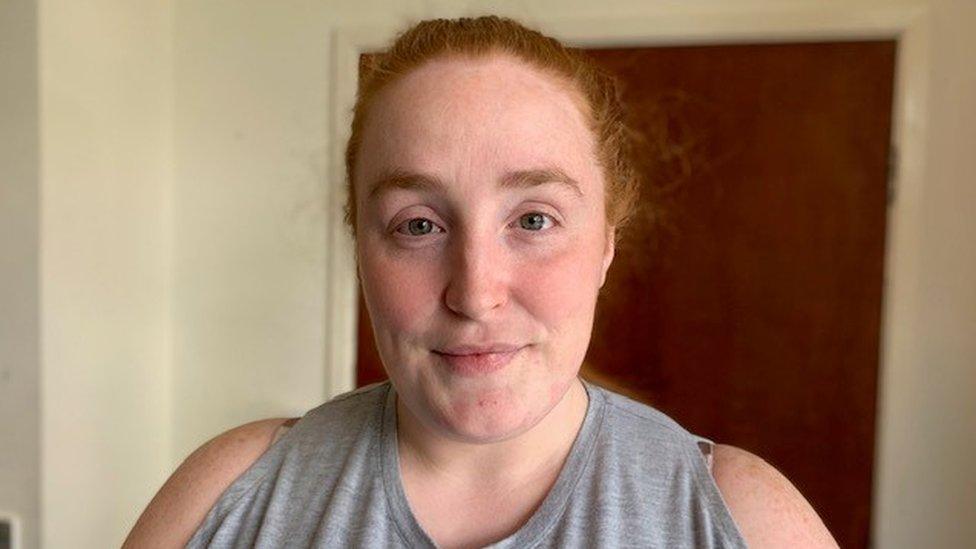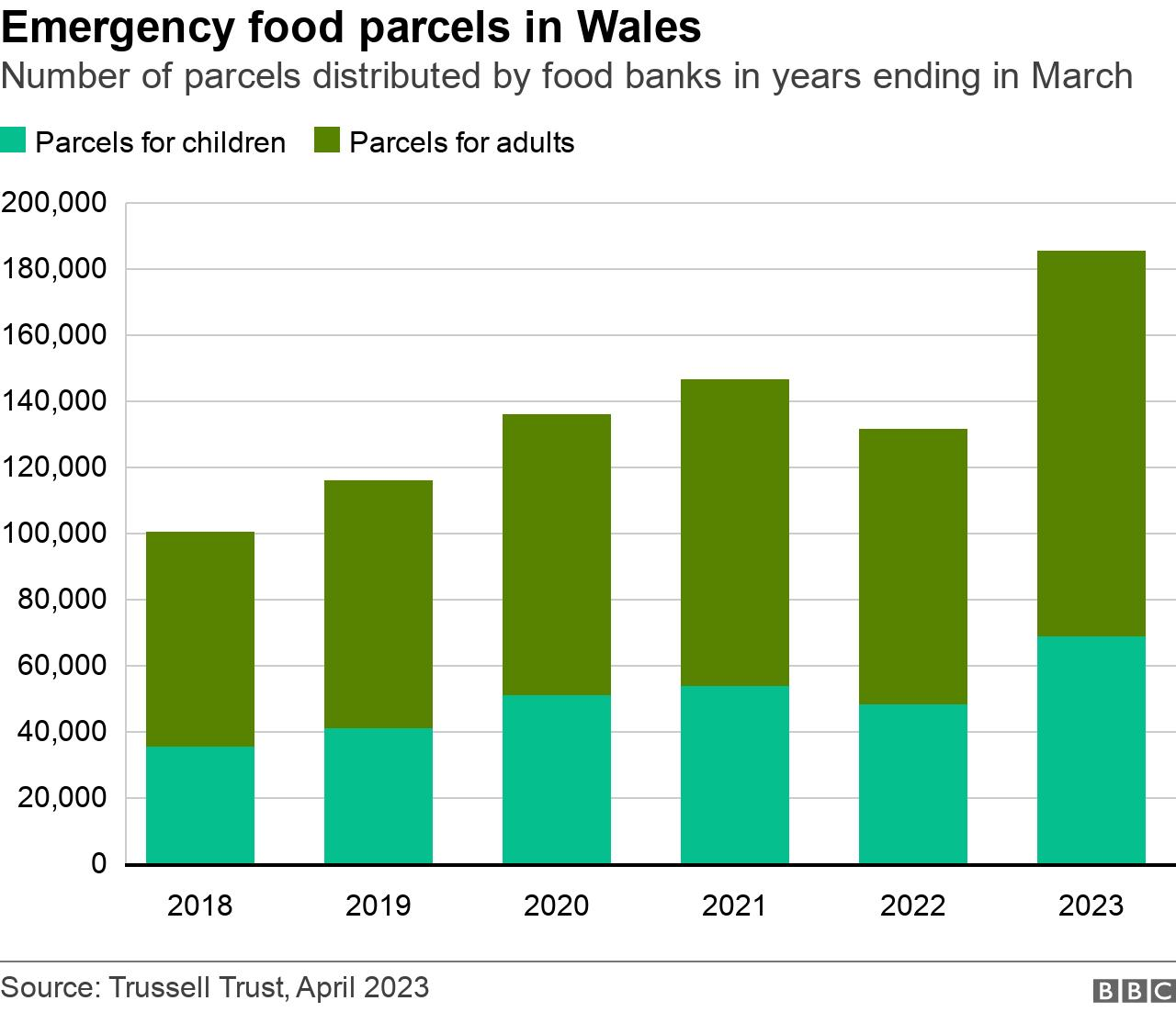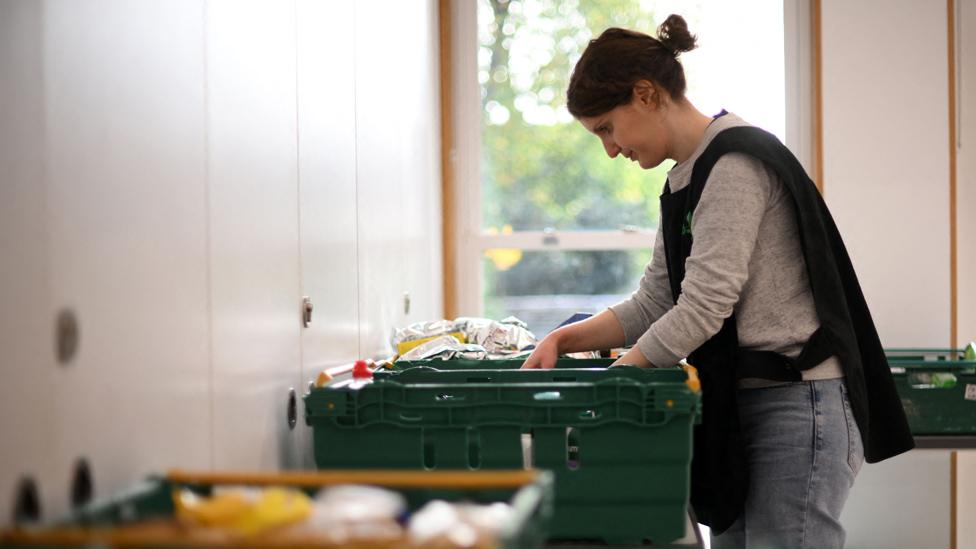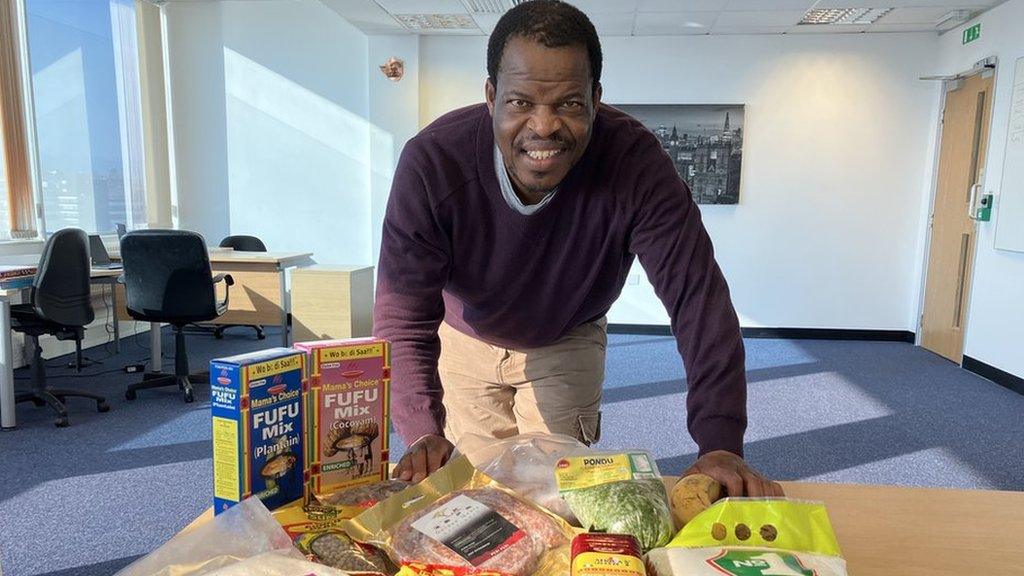Cost of Living: Emergency food parcel demand at record high
- Published

Alaw Davies says she tries to "give back" by donating goods to the food bank when she can
Demand for emergency food parcels in Wales has hit a record high after more than 185,000 were provided by the Trussell Trust in the past year.
Of the 185,230 parcels provided between April 2022 and March 2023, 69,683 went to children.
Alaw Davies, a 24-year-old mother said she never thought she would need a foodbank but without it, her children would go hungry.
A Welsh government spokesman said more than £1.6bn had been invested to help.
Meanwhile, the UK government said it was "committed to eradicating poverty".
Ms Davies, from Penygroes, who uses the Arfon Foodbank in Caernarfon, Gwynedd, said: "No-one understands how important it really is until you need to use the service.
"I never thought I would have to use it, but here I am.
"I've been judged before for using a foodbank, but without it my children wouldn't be able to eat."
She said it was difficult "trying to balance the money between house bills, food, trying to keep the house warm, trying to keep a roof over my children's heads, making sure they're fed".

Jamie Spiers said: "I think it's a fantastic service, people giving their time up, the donations from people"
Jamie Spiers, 38, is a qualified outdoor instructor, who lived "off-grid" in his van around Llanberis for two years. In January he injured his back, forcing him to quit his job.
Mr Spiers said the past few months on Universal Credit had been "a struggle" as he only gets £298 a month.
He said having to use a food bank "upsets your sense of pride a little bit" but "you have to take help when it's there".

Trey McCain said on one Friday last month, the centre gave out 100 parcels, a figure usually only seen at Christmas
Arfon food bank manager Trey McCain said the cost of living crisis was also affecting peoples' ability to donate, meaning the centre sometimes had to buy food itself.
A volunteer at the centre, Nigel Beidas, said he wants to "help people in society".
"The whole cost of living now, everything has gone up," he said.
"Energy prices have gone up, groceries have gone up, the cost of transport's gone up.

People are being forced to use food banks because of a "big squeeze" on wages and prices, says volunteer Nick Beidas
"It's just a big squeeze right across the board and wages haven't gone up to match in a lot of cases," he added.
"Most people don't want to come to a food bank and it's a terrible situation the country's in I think if you have to have as many food banks as we do."
The Trussell Trust said the amount of emergency food parcels distributed by its food banks in Wales has risen 85% since 2017-18 and last year saw a 41% increase, the highest of the UK nations.
Susan Lloyd-Selby, the charity's network lead for Wales, said some food banks were at "breaking point".
The Trussell Trust's end-of-year statistics showed that 56,000 people used one of their 150 food banks in Wales for the first time.
December 2022 was the busiest month on record, with 24,662 emergency food parcels delivered, with the charity saying the cost of living crisis, following the Covid pandemic, placed extra pressure on peoples' finances.

The highest number of emergency food parcels ever given out by the Trussell trust was in the past three months
Ms Lloyd-Selby said the figures showed the increasing need for food banks, adding that the Welsh government needed to develop a plan "to reduce and prevent the need for emergency food aid as well as establishing a Welsh benefits system".
"Everyone in Wales should be able to afford the essentials - to buy their own food and heat their homes," she said.
The Welsh government said: "In 2022-23, we invested more than £1.6bn to help people through this cost of living crisis.
"This includes nearly £6m to help communities and individuals with emergency food aid and to develop local sustainable solutions to help tackle the root causes of food poverty."
It said it had invested in the Single Advice Fund, external to help people claim what they were entitled to while calling on Westminster, which "holds powers over the tax and welfare system" to take "meaningful action".
In response, the UK government said: "We are committed to eradicating poverty and we recognise the pressures of the rising cost of living which is why we have uprated benefits by 10.1% as well as making an unprecedented increase to the National Living Wage this month.
"This is on top of changes already made to Universal Credit which mean claimants can keep more of their hard-earned money - a boost worth £1,000 a year on average."

WHO DO WE THINK WE ARE?: Huw Edwards explores modern Welsh identity
HIRAETH: The Ukrainian women in Wales, longing for a place to call home

- Published26 April 2023

- Published27 January 2023

- Published15 February 2023
